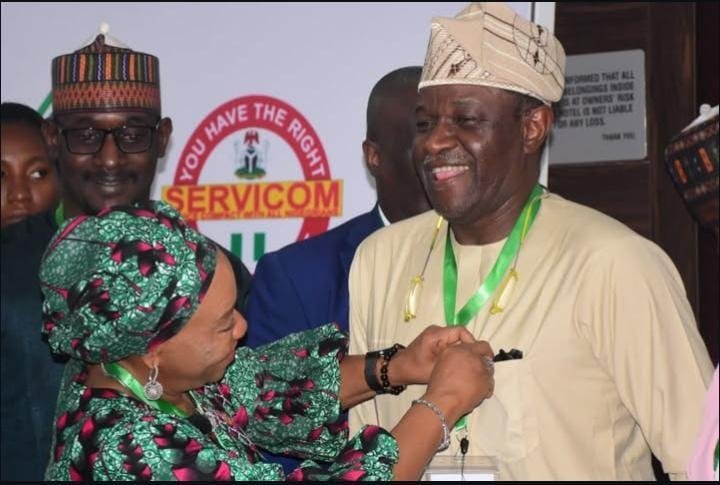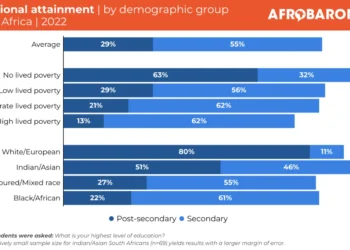Good education isn’t cheap. In the US, college alumni are a significant source of funding for college education. Harvard University famously has over $50 billion in endowment funds. Do you see something like this happening in Nigeria one day and how do you think it can start?
I think it’s a really good question so let me try and build up the answer for you in a particular way. When you see institutions like Harvard in the US, or Cambridge in the UK, or University of Maastricht in the Netherlands, when you see these institutions attracting donations, funding from their alumni, it’s because those people had a good experience in those institutions and they attribute, oftentimes, their success today to the institution where they were taught, where they graduated. One of the things that this loan scheme does is that it says, we’re going to give your school money on your behalf and we’re going to give all your colleagues, all the cohort, the school which applied for the loan money on behalf of the cohort. Now, this puts the institutions in a position where they can invest, they can invest better in the institution. The institutional authorities can invest better in the institution. If they invest properly they will get better facilities, they’ll create a better learning environment, they’ll attract better staff, academic and non-academic. Therefore the assumption is that the students who go through that institution will have a better experience, will be better equipped because of the positivity around them and because of the ease of learning too. If you get that and people come out confident, well-qualified and with a piece of paper that they can be proud of – and people say, if you went to that school, we’ll employ you because we know that school does not mess around, that is how it starts. If the institutions do the right thing with the money that they are given through the students’ voting power by deciding to attend their school, and bring their loan to that school – then we will begin to graduate students who say, you know what? I went to that school. I got everything I wanted to get out of that school. I’m now a successful person. I will contribute to the success of my school. So that’s where the alumni mentality and success of it comes from globally. If you go to a school where you didn’t enjoy the experience and you didn’t feel it contributed much to you, even if you give them something, you will only be giving it because you feel sorry for those who are there. But if you had a good experience there, you’ll want others, if you’re a good person, to have the same thing and therefore you will contribute. But I’ll just say one thing to you. Since we started, we’ve had a number of people who took loans in Nigeria in the seventies who have given us back that money now we ourselves are a financial institution. We will have our own cohort of people who if we do a good job, will come back and say, you know what? I got a loan from you that took me to an institution that improved or changed my life. Therefore I’m going to contribute. And if you remember I said earlier, the law allows NELFUND to take donations, to receive donations, to take gifts, to receive gifts, to fundraise if you like. And if we do a good job, particularly if we are transparent about the money we have, how we spend it, who we give it to, it’ll make people more confident about giving money to the fund. So we have our own endowment opportunity if you can call it that.

Talking about NELFUND’s role in the national development plan, from the education perspective and also concerning economic development policies; and of course, taking that back to the revolving fund for future beneficiaries, through loan recovery, how do you plan to do that going forward?
Okay, so the first thing I would want to say is that we have inherited courses and institutions of state that we can do nothing about. So if somebody approaches us today and says, I’m studying the relationship between the sun and the moon because we are obliged today to fund pretty much all courses in tertiary institutions, we would probably need to give a loan to that person for studying the relationship between the sun and the moon. It doesn’t mean that that course is not relevant, it just means it’s not relevant for Nigeria today. The things that we need to build this nation are really relatively basic. So there are some courses that are no longer required and we need to think carefully into the future about what we will do with those courses. They may well be accredited, they may well be great courses for Eskimos, but they may not be good courses for Nigerians. And we do have a lot of legacy issues going on here. As any country that has been influenced very heavily by foreign powers may have, there’s a large overhang. The approach therefore that we have is a research-based approach. We’re looking constantly at what the country needs and we want to fund students to do courses that lead to greater or faster national development. We need roads, we need buildings, we need electricity or power. We need to harness our natural resources using our own people. We need to find ways of preserving our foreign exchange so that we pay our own people to do things in Naira rather than pay other people to do it for us in dollars. We need to domesticate our education such that we are less dependent, not just on imports but on foreign input if you like. Today, we don’t produce cars. So every time we buy a car, we’ve created a job somewhere else. However, we do produce leather, therefore why should we be buying leather bags from any other country other than Nigeria? So, some we have to be dependent on because we need the equipment or the goods, but others we just don’t need. We can manufacture here, we need to do them better so that the market will be more ready to take it. The local market will be more ready to take it. I’ll tell you something else. So I see this sort of thing in several buckets. One is, what are the things that we need today that will drive growth in Nigeria? What are the skills we need? The second is, what are the things we need to be looking at today that will drive economic growth in the future? Because economic growth in the future is not necessarily the same as economic growth now. And I think the third bucket is, and I alluded to it a few minutes ago, what are the things that we can do for ourselves today that we’re currently asking other people at great cost to do for us, even though we can do it ourselves if only we had the education. So those are the sort of three broad buckets that I would want to put it into. And I want to use an example for you of what I’m talking about. When I was a young boy, nobody in Nigeria, none of my parents’ friends bought automatic cars. They all had manual cars because nobody could fix an automatic gearbox on a car. Also, battery technology wasn’t as good as it is today. So, sometimes you’d get up in the morning, go to the car, try to start it and it wouldn’t start. The battery just didn’t have enough power therefore somebody would have to push the car for you. You release the handbrake, and while in motion, put the car into gear and then the car goes, and it goes for the rest of the day. Today, battery technology has improved so it takes a lot to run a battery down. Because of that, how many people buy manual cars today? Very few. Because between the time I described and today, an army of people have learned how to fix cars that are automatic. What’s my point? At the time that people were buying manual cars, nobody saw the future of automatic cars and I can go on and on and on. Even electric windows were a very novel thing then. Today, you can’t buy a car with a manual winder. So what does the future look like? Is it electric cars? Is it petrol cars? Is it gas fired? We need to train people today for the emerging technologies and emerging developments of tomorrow. I think the other thing that we need to recognise is that in order for us to create jobs, we have to regulate the working environment. If you walk into a pharmacy in Nigeria today, thanks to NAFDAC, there must be a pharmacist on site. But if you want to sell petrol, if you own a petrol station and you want to sell petrol from your petrol station, you can take anybody off the road, put a nozzle in one hand, a POS in another, and they’re selling petrol all day long. They’ve had no safety training, they’ve had no training around health and safety and the rest of it as there’s no status attached to blue collar jobs. We need to start training people, giving them certificates so they can earn more money. If you want to fly in an aeroplane today, you need to have two pilots, only one’s going to fly the plane, not two. But there’s a recognition that you need two for safety. So if one goes down, the other one’s there. We need to start looking at many industries here where people are just cutting corners, taking risks and making huge profits at the top, but not creating very many meaningful jobs at the bottom. So, we at NELFUND give loans and our job may not be to create jobs, but eventually the people we’re giving loans to will come back to us and say, you gave me a loan, where’s the job? Because of that, we have to think about these things intelligently and stop thinking this is my job, I’m just going to do it. What’s the impact? What are the ramifications of what you’re doing? So I hope I have answered your question.
Subscribe To Unlimited Premium Digest.
This is premium content. Subscribe or Login to read the entire article.
Subscribe
Gain access to all our Premium contents.More than 1,000+ Articles, News, & Scholarships.





































































 EduTimes Africa, a product of Education Times Africa, is a magazine publication that aims to lend its support to close the yawning gap in Africa's educational development.
EduTimes Africa, a product of Education Times Africa, is a magazine publication that aims to lend its support to close the yawning gap in Africa's educational development.

